Clinical Nursing Discussion: CAM, Never Events, and Patient Care
VerifiedAdded on 2023/06/08
|5
|1046
|363
Discussion Board Post
AI Summary
This clinical nursing discussion addresses the use of alternative therapies in cancer treatment, focusing on challenges nurses face, such as inadequate training, and ethical considerations in providing care. It explores the integration of Complementary and Alternative Medicine (CAM) approaches, emphasizing the need for specialized training, patient assessment, and management. The discussion also outlines essential elements for a nurse's teaching plan, including patient education and shared decision-making. Furthermore, the assignment delves into the prevention of "never events" through improved nursing practices, adherence to CMS standards, and the impact of nurses on clinical outcomes. It highlights the challenges nurses face in quality improvement, such as leadership and resource limitations, and emphasizes the importance of strategic agendas to enhance patient care and reduce medical errors. The discussion references relevant literature to support its points.
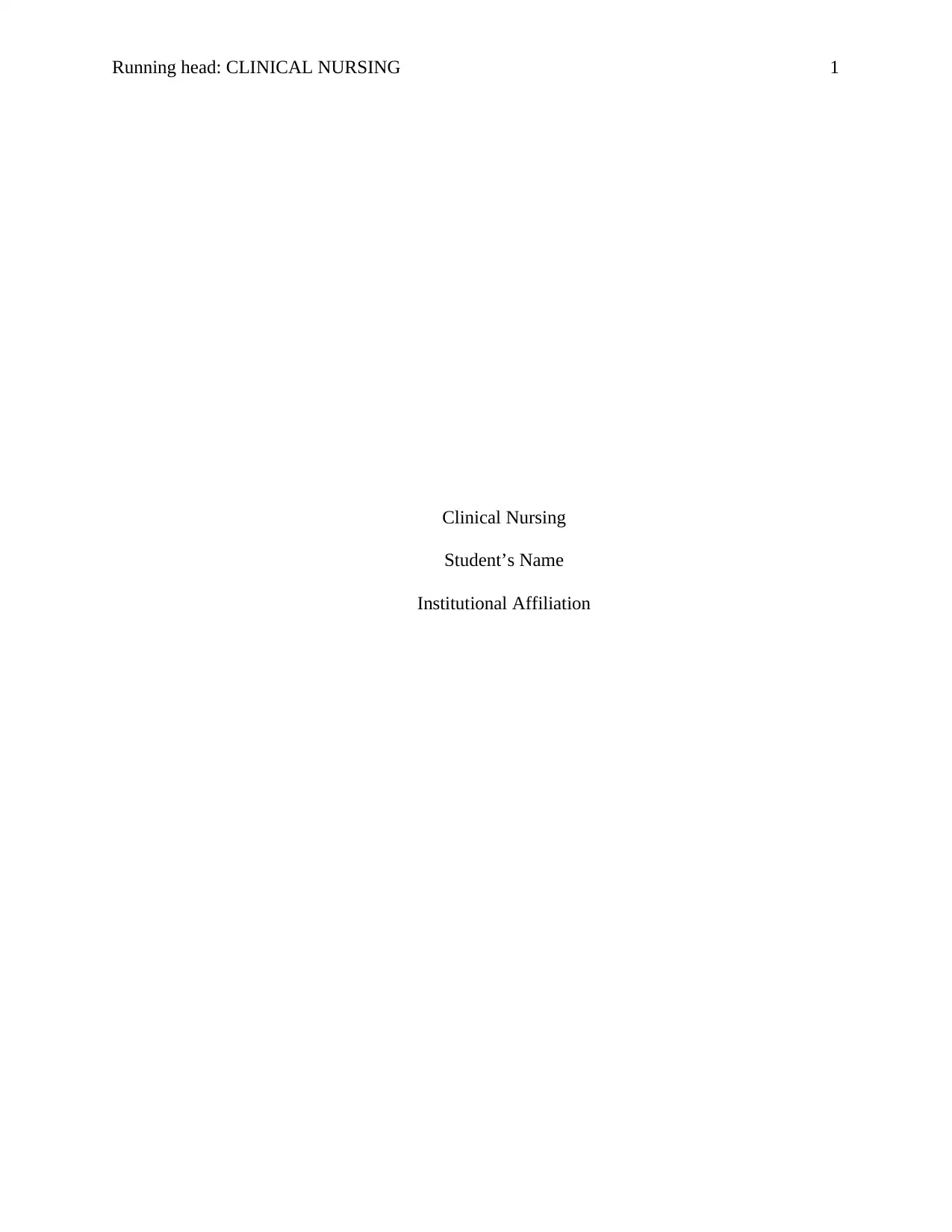
Running head: CLINICAL NURSING 1
Clinical Nursing
Student’s Name
Institutional Affiliation
Clinical Nursing
Student’s Name
Institutional Affiliation
Paraphrase This Document
Need a fresh take? Get an instant paraphrase of this document with our AI Paraphraser
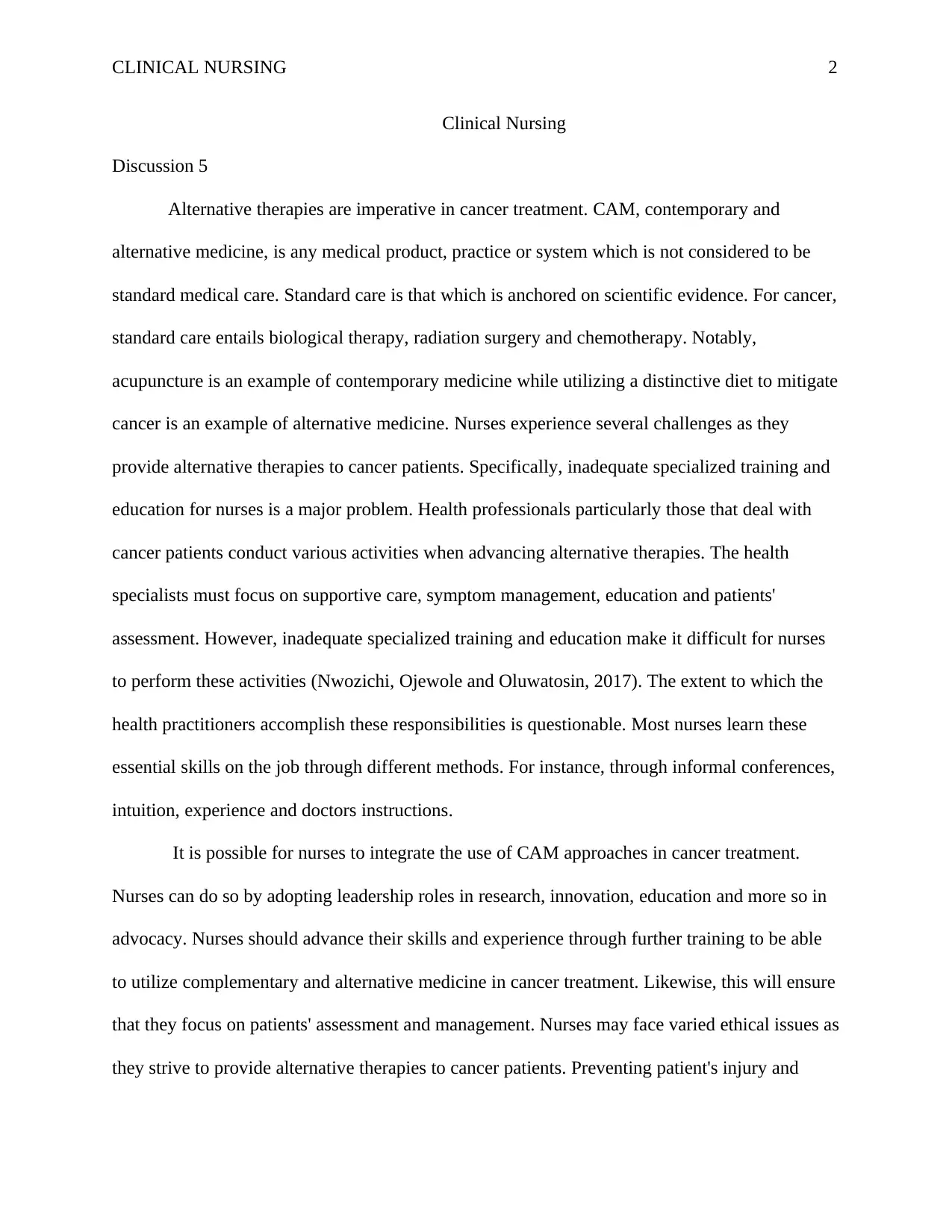
CLINICAL NURSING 2
Clinical Nursing
Discussion 5
Alternative therapies are imperative in cancer treatment. CAM, contemporary and
alternative medicine, is any medical product, practice or system which is not considered to be
standard medical care. Standard care is that which is anchored on scientific evidence. For cancer,
standard care entails biological therapy, radiation surgery and chemotherapy. Notably,
acupuncture is an example of contemporary medicine while utilizing a distinctive diet to mitigate
cancer is an example of alternative medicine. Nurses experience several challenges as they
provide alternative therapies to cancer patients. Specifically, inadequate specialized training and
education for nurses is a major problem. Health professionals particularly those that deal with
cancer patients conduct various activities when advancing alternative therapies. The health
specialists must focus on supportive care, symptom management, education and patients'
assessment. However, inadequate specialized training and education make it difficult for nurses
to perform these activities (Nwozichi, Ojewole and Oluwatosin, 2017). The extent to which the
health practitioners accomplish these responsibilities is questionable. Most nurses learn these
essential skills on the job through different methods. For instance, through informal conferences,
intuition, experience and doctors instructions.
It is possible for nurses to integrate the use of CAM approaches in cancer treatment.
Nurses can do so by adopting leadership roles in research, innovation, education and more so in
advocacy. Nurses should advance their skills and experience through further training to be able
to utilize complementary and alternative medicine in cancer treatment. Likewise, this will ensure
that they focus on patients' assessment and management. Nurses may face varied ethical issues as
they strive to provide alternative therapies to cancer patients. Preventing patient's injury and
Clinical Nursing
Discussion 5
Alternative therapies are imperative in cancer treatment. CAM, contemporary and
alternative medicine, is any medical product, practice or system which is not considered to be
standard medical care. Standard care is that which is anchored on scientific evidence. For cancer,
standard care entails biological therapy, radiation surgery and chemotherapy. Notably,
acupuncture is an example of contemporary medicine while utilizing a distinctive diet to mitigate
cancer is an example of alternative medicine. Nurses experience several challenges as they
provide alternative therapies to cancer patients. Specifically, inadequate specialized training and
education for nurses is a major problem. Health professionals particularly those that deal with
cancer patients conduct various activities when advancing alternative therapies. The health
specialists must focus on supportive care, symptom management, education and patients'
assessment. However, inadequate specialized training and education make it difficult for nurses
to perform these activities (Nwozichi, Ojewole and Oluwatosin, 2017). The extent to which the
health practitioners accomplish these responsibilities is questionable. Most nurses learn these
essential skills on the job through different methods. For instance, through informal conferences,
intuition, experience and doctors instructions.
It is possible for nurses to integrate the use of CAM approaches in cancer treatment.
Nurses can do so by adopting leadership roles in research, innovation, education and more so in
advocacy. Nurses should advance their skills and experience through further training to be able
to utilize complementary and alternative medicine in cancer treatment. Likewise, this will ensure
that they focus on patients' assessment and management. Nurses may face varied ethical issues as
they strive to provide alternative therapies to cancer patients. Preventing patient's injury and
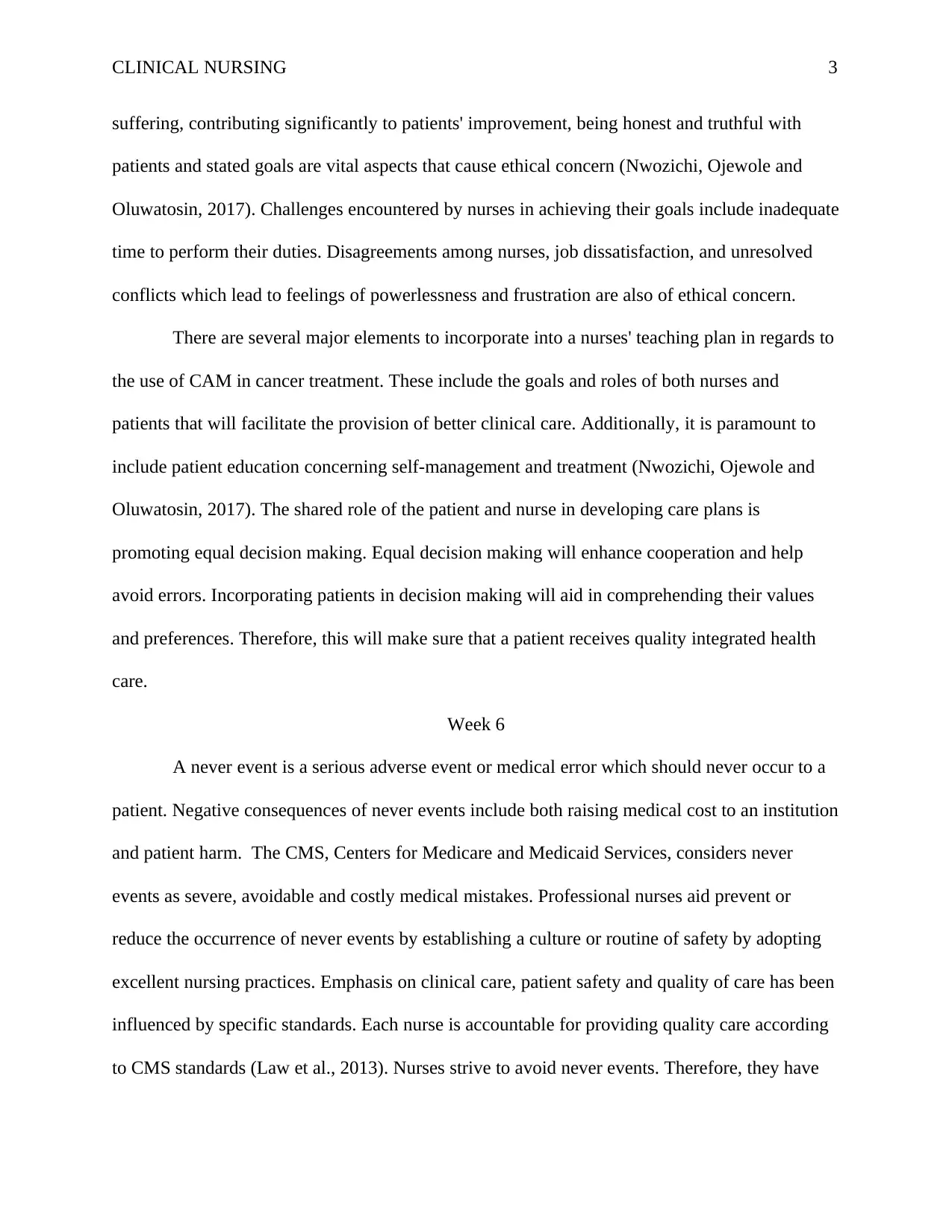
CLINICAL NURSING 3
suffering, contributing significantly to patients' improvement, being honest and truthful with
patients and stated goals are vital aspects that cause ethical concern (Nwozichi, Ojewole and
Oluwatosin, 2017). Challenges encountered by nurses in achieving their goals include inadequate
time to perform their duties. Disagreements among nurses, job dissatisfaction, and unresolved
conflicts which lead to feelings of powerlessness and frustration are also of ethical concern.
There are several major elements to incorporate into a nurses' teaching plan in regards to
the use of CAM in cancer treatment. These include the goals and roles of both nurses and
patients that will facilitate the provision of better clinical care. Additionally, it is paramount to
include patient education concerning self-management and treatment (Nwozichi, Ojewole and
Oluwatosin, 2017). The shared role of the patient and nurse in developing care plans is
promoting equal decision making. Equal decision making will enhance cooperation and help
avoid errors. Incorporating patients in decision making will aid in comprehending their values
and preferences. Therefore, this will make sure that a patient receives quality integrated health
care.
Week 6
A never event is a serious adverse event or medical error which should never occur to a
patient. Negative consequences of never events include both raising medical cost to an institution
and patient harm. The CMS, Centers for Medicare and Medicaid Services, considers never
events as severe, avoidable and costly medical mistakes. Professional nurses aid prevent or
reduce the occurrence of never events by establishing a culture or routine of safety by adopting
excellent nursing practices. Emphasis on clinical care, patient safety and quality of care has been
influenced by specific standards. Each nurse is accountable for providing quality care according
to CMS standards (Law et al., 2013). Nurses strive to avoid never events. Therefore, they have
suffering, contributing significantly to patients' improvement, being honest and truthful with
patients and stated goals are vital aspects that cause ethical concern (Nwozichi, Ojewole and
Oluwatosin, 2017). Challenges encountered by nurses in achieving their goals include inadequate
time to perform their duties. Disagreements among nurses, job dissatisfaction, and unresolved
conflicts which lead to feelings of powerlessness and frustration are also of ethical concern.
There are several major elements to incorporate into a nurses' teaching plan in regards to
the use of CAM in cancer treatment. These include the goals and roles of both nurses and
patients that will facilitate the provision of better clinical care. Additionally, it is paramount to
include patient education concerning self-management and treatment (Nwozichi, Ojewole and
Oluwatosin, 2017). The shared role of the patient and nurse in developing care plans is
promoting equal decision making. Equal decision making will enhance cooperation and help
avoid errors. Incorporating patients in decision making will aid in comprehending their values
and preferences. Therefore, this will make sure that a patient receives quality integrated health
care.
Week 6
A never event is a serious adverse event or medical error which should never occur to a
patient. Negative consequences of never events include both raising medical cost to an institution
and patient harm. The CMS, Centers for Medicare and Medicaid Services, considers never
events as severe, avoidable and costly medical mistakes. Professional nurses aid prevent or
reduce the occurrence of never events by establishing a culture or routine of safety by adopting
excellent nursing practices. Emphasis on clinical care, patient safety and quality of care has been
influenced by specific standards. Each nurse is accountable for providing quality care according
to CMS standards (Law et al., 2013). Nurses strive to avoid never events. Therefore, they have
⊘ This is a preview!⊘
Do you want full access?
Subscribe today to unlock all pages.

Trusted by 1+ million students worldwide
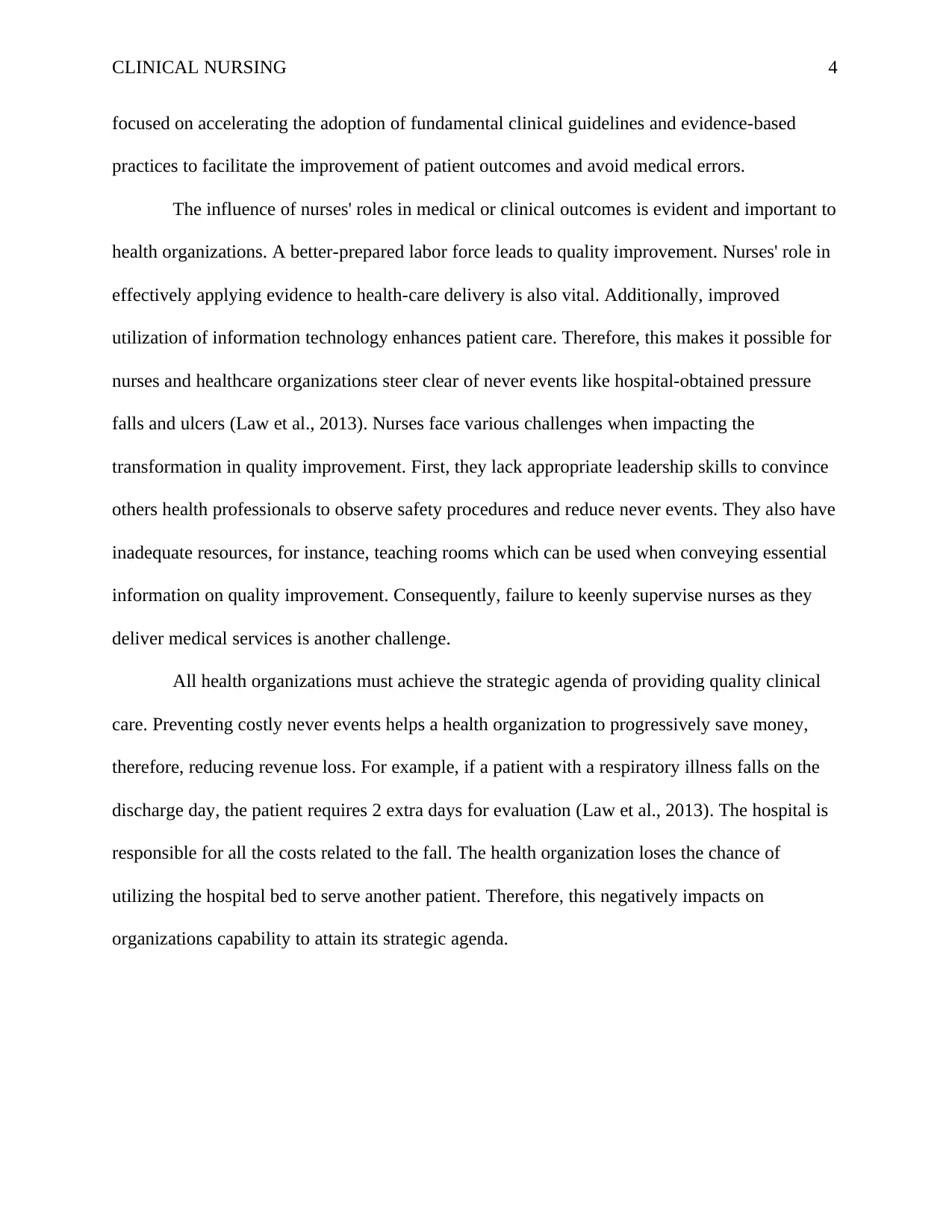
CLINICAL NURSING 4
focused on accelerating the adoption of fundamental clinical guidelines and evidence-based
practices to facilitate the improvement of patient outcomes and avoid medical errors.
The influence of nurses' roles in medical or clinical outcomes is evident and important to
health organizations. A better-prepared labor force leads to quality improvement. Nurses' role in
effectively applying evidence to health-care delivery is also vital. Additionally, improved
utilization of information technology enhances patient care. Therefore, this makes it possible for
nurses and healthcare organizations steer clear of never events like hospital-obtained pressure
falls and ulcers (Law et al., 2013). Nurses face various challenges when impacting the
transformation in quality improvement. First, they lack appropriate leadership skills to convince
others health professionals to observe safety procedures and reduce never events. They also have
inadequate resources, for instance, teaching rooms which can be used when conveying essential
information on quality improvement. Consequently, failure to keenly supervise nurses as they
deliver medical services is another challenge.
All health organizations must achieve the strategic agenda of providing quality clinical
care. Preventing costly never events helps a health organization to progressively save money,
therefore, reducing revenue loss. For example, if a patient with a respiratory illness falls on the
discharge day, the patient requires 2 extra days for evaluation (Law et al., 2013). The hospital is
responsible for all the costs related to the fall. The health organization loses the chance of
utilizing the hospital bed to serve another patient. Therefore, this negatively impacts on
organizations capability to attain its strategic agenda.
focused on accelerating the adoption of fundamental clinical guidelines and evidence-based
practices to facilitate the improvement of patient outcomes and avoid medical errors.
The influence of nurses' roles in medical or clinical outcomes is evident and important to
health organizations. A better-prepared labor force leads to quality improvement. Nurses' role in
effectively applying evidence to health-care delivery is also vital. Additionally, improved
utilization of information technology enhances patient care. Therefore, this makes it possible for
nurses and healthcare organizations steer clear of never events like hospital-obtained pressure
falls and ulcers (Law et al., 2013). Nurses face various challenges when impacting the
transformation in quality improvement. First, they lack appropriate leadership skills to convince
others health professionals to observe safety procedures and reduce never events. They also have
inadequate resources, for instance, teaching rooms which can be used when conveying essential
information on quality improvement. Consequently, failure to keenly supervise nurses as they
deliver medical services is another challenge.
All health organizations must achieve the strategic agenda of providing quality clinical
care. Preventing costly never events helps a health organization to progressively save money,
therefore, reducing revenue loss. For example, if a patient with a respiratory illness falls on the
discharge day, the patient requires 2 extra days for evaluation (Law et al., 2013). The hospital is
responsible for all the costs related to the fall. The health organization loses the chance of
utilizing the hospital bed to serve another patient. Therefore, this negatively impacts on
organizations capability to attain its strategic agenda.
Paraphrase This Document
Need a fresh take? Get an instant paraphrase of this document with our AI Paraphraser
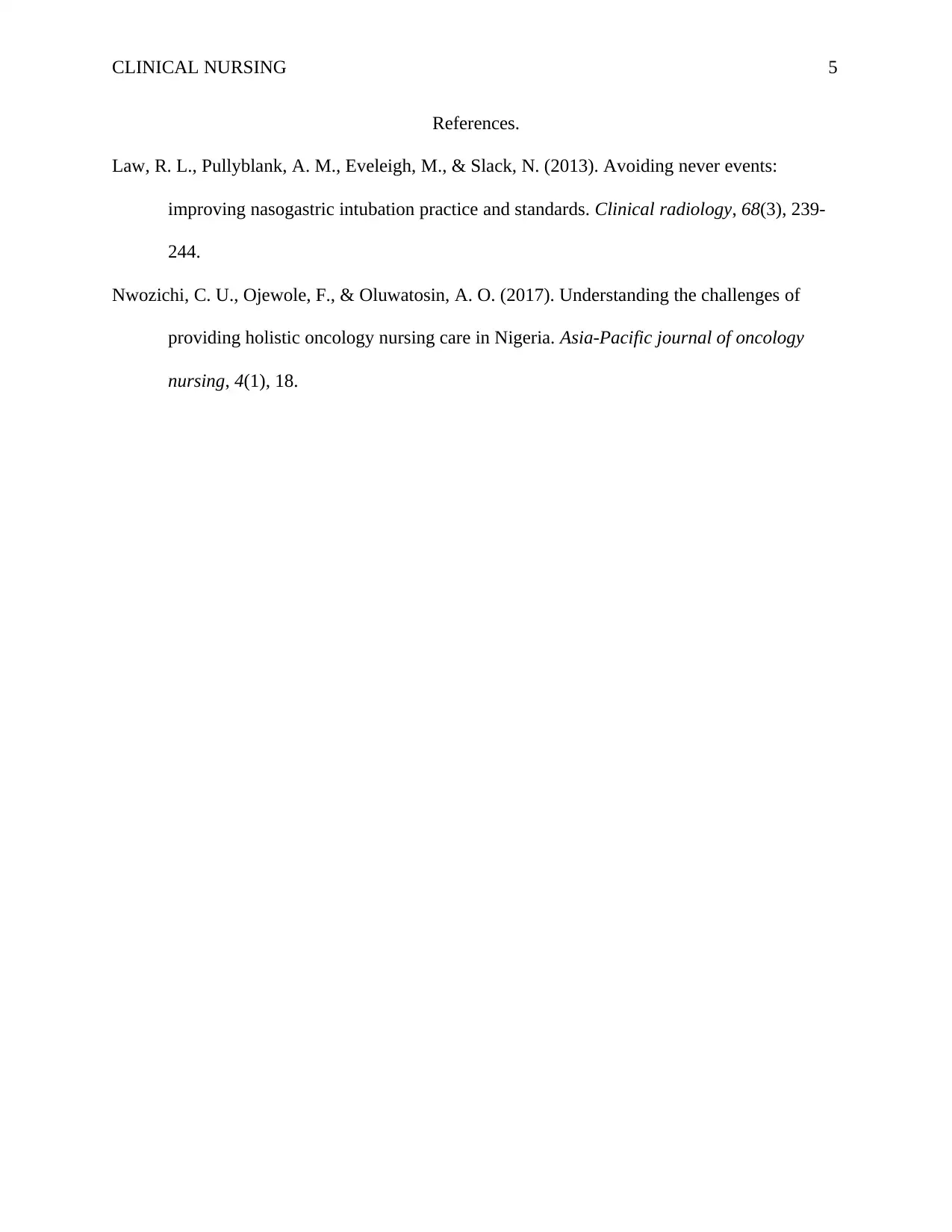
CLINICAL NURSING 5
References.
Law, R. L., Pullyblank, A. M., Eveleigh, M., & Slack, N. (2013). Avoiding never events:
improving nasogastric intubation practice and standards. Clinical radiology, 68(3), 239-
244.
Nwozichi, C. U., Ojewole, F., & Oluwatosin, A. O. (2017). Understanding the challenges of
providing holistic oncology nursing care in Nigeria. Asia-Pacific journal of oncology
nursing, 4(1), 18.
References.
Law, R. L., Pullyblank, A. M., Eveleigh, M., & Slack, N. (2013). Avoiding never events:
improving nasogastric intubation practice and standards. Clinical radiology, 68(3), 239-
244.
Nwozichi, C. U., Ojewole, F., & Oluwatosin, A. O. (2017). Understanding the challenges of
providing holistic oncology nursing care in Nigeria. Asia-Pacific journal of oncology
nursing, 4(1), 18.
1 out of 5
Related Documents
Your All-in-One AI-Powered Toolkit for Academic Success.
+13062052269
info@desklib.com
Available 24*7 on WhatsApp / Email
![[object Object]](/_next/static/media/star-bottom.7253800d.svg)
Unlock your academic potential
Copyright © 2020–2026 A2Z Services. All Rights Reserved. Developed and managed by ZUCOL.





